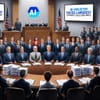The AI industry is facing a significant challenge with the certification of the largest copyright class action lawsuit against AI firms like Anthropic. This lawsuit alleges that these companies used pirated books to train their AI models without permission, potentially involving millions of copyrighted works and billions in damages.
Industry groups are warning that this lawsuit could financially ruin the entire AI sector if up to 7 million claimants join and force a settlement, with potential damages estimated at over $1 trillion. Anthropic is appealing the class certification, arguing that it was made at "warp speed" without proper analysis and that the company faces trial in just four months.
The potential liability in this lawsuit exerts incredibly coercive settlement pressure, which may lead to settlements rather than allowing courts to resolve fundamental questions about AI training. The Consumer Technology Association and Computer and Communications Industry Association have backed Anthropic, warning that the district court's erroneous class certification would threaten America's global technological competitiveness.
The outcome of this lawsuit remains uncertain, but its implications will likely influence global tech policy for years to come. The case questions the legality of using copyrighted works in generative AI and may set a precedent for how AI companies approach training data and investment in the sector. Regulators are watching closely, with some advocating for new frameworks to balance innovation and creator rights.
The lawsuit's outcome could reshape data sourcing norms and impact the future of AI development, potentially stifling investment and innovation in the sector. As the AI industry continues to grow and evolve, the need for clarity on copyright laws and AI training data has become increasingly pressing. The result of this lawsuit will likely have far-reaching consequences for the industry and beyond.


